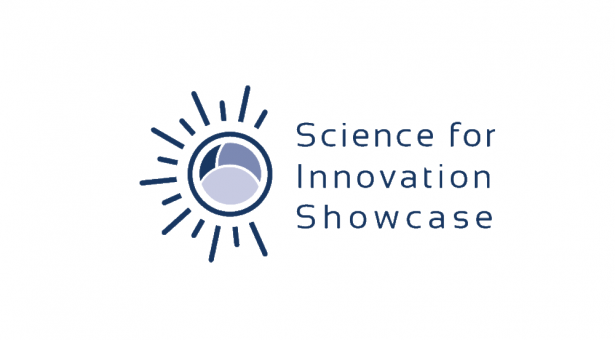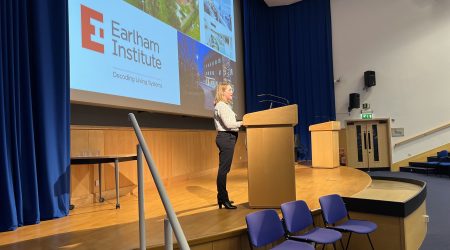First ever Science Innovation Showcase

Our first ever ‘Science for Innovation Showcase’, took place over two days last week, bringing together leading scientists from the Norwich Research Park and more than 60 industry representatives.
The aim of the event, which took place in our Conference Centre, was to develop and promote new relationships between scientists and industry, breaking down any barriers and enabling productive collaborations.
The John Innes Centre has a long history of working with industrial partners and has many strong relationships but recognised there was still more that could be done to improve awareness of the full range of our research globally.
Organised by our ‘Knowledge Exchange and Commercialisation’ team, the event was the first of its kind for the John Innes Centre.
The brainchild of Dr Sebastian Rohrer, Crop Protection Research Manager at BASF, and Dr Jonathan Clarke, Head of Business Development at the John Innes Centre, who sought to further reduce the gap between fundamental research and industry.
Dr Rohrer, a keynote speaker, said: “The idea for this event was to create a critical mass of brainpower in one place at a given time, to allow people to interact directly, because that sparks creativity, rather than indirectly and focussed always on project-related interaction.”
“I’ve made several visits to the John Innes Centre and it’s always been interesting and inspiring, but it was always focused on the particular project we were running at the time. I had the impression that there is so much going on outside my direct field of vision that it would be a shame not to tap into that and make more use of it.”
Dr Clarke added: “We wanted to talk to industry, and ensure we gave them something valuable, through insight into our science, but also to help our own scientists gain a greater understanding of how their science is of value to industry. By bringing everybody together in this way, it hopefully makes it easier for mutually-beneficial collaboration to happen in the future.”
The showcase was attended by representatives from across the biotech industry, including, agri-tech, farming, pharmaceuticals, manufacturing, breeding, environment, chemicals and research.
The programme was split into four: one session for each of our Institute Strategic Programmes, with 20 of our Project Leaders delivering presentations on the latest and most promising advances coming out of their labs.
Following the talks, the discussion opened-up allowing the audience the chance to pose questions to a panel made up of the speakers from each research programme, and book one-to-one meetings with scientists to discuss possible collaborations.
There was also ample chance for networking between talks, with a number of posters sessions, coffee breaks and an evening soiree with dinner and a string quartet band.
The showcase was praised by those involved for its diverse ‘melting pot’ of participants and for successfully forging new and promising relationships.
100% of participants said they learnt something new, and 94% said they made a new contact point at the John Innes Centre, discovering opportunities to pursue after the event.
Professor Mark Banfield, one of the 20 scientists to deliver a presentation said: “Quite often the passion of scientists at universities and academic institutes like the John Innes Centre is in the fundamental research we do. Events such as this help us to broadcast that and to see how that could be of interest to industry.”
“I think there is a gap in knowledge on both sides. It’s great for industrial-based people to come here today and see what we are doing and it would also be great for us to go back in the other direction to see what is happening in industrial settings.”
Dr Belinda Clarke, Director of Agri-Tech East, who facilitated the showcase, thanked delegates for an “amazing” two days.
“We have really seen the importance of science partnering with industry to get innovations to market and starting to deliver impact. We’ve also seen the innovations that have been built on, in some cases, decades of fundamental research and understanding of natural biological processes and it is important that we recognise the importance of that.”
Dr Ben Huckle, External Collaboration Lead at GlaxoSmithKline, said: “It was great to hear what the John Innes Centre can offer to industry and the UK in general, with expertise ranging from nutritional tomatoes to addressing ash dieback disease.”
Dr Jon Clarke, reflecting on the event, said: “I’d like to thank our guests from industry for coming to the showcase and our speakers for giving great insight into the science at the John Innes Centre in a way that was truly enabling and inspiring.
“I’d also like to thank the John Innes spin-out companies and social enterprises who gave our industry guests an insight into how we want to extend our science outwards whether its directly in collaboration with industrial colleagues or whether its creating new ventures.”
Professor Chris Ridout stressed that although the event was the first of its kind, the commitment to interaction with business was a daily priority for many researchers at the John Innes Centre.
“Our interaction with business is a very dynamic environment. No two days are the same here…we meet people for a chat we can talk about ideas and those ideas, maybe, spark new lines of enquiry and we end up working together.”
He highlighted the BBSRC Flexible Interchange Programme as an example of this ethos of knowledge exchange.
“Someone from industry can come here to the John Innes Centre and they can learn techniques they can take back with them to address a particular challenge. It’s also great for us as scientists because we learn from them about what are the commercial priorities for industry.”

